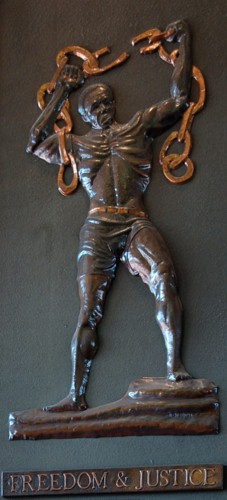No dictator, no invader, can hold an imprisoned population by force of arms forever. J. Michael Straczynski
The longer version of the quote is:
“No dictator, no invader, can hold an imprisoned population by the force of arms forever. There is no greater power in the universe than the need for freedom. Against that power governments, and tyrants, and armies can not stand. The Centauri learned this lesson once. We will teach it to them again. Though it take a thousand years, we will be free.” – Written by JMS and spoken by Narn Ambassador G’Kar in the TV show Babylon 5, during the Season 2 episode titled “The Long, Twilight Struggle“
What does that mean?
To me, it speaks of the unbending spirit of freedom. In the quote, it is spoken by an alien, but it still rings true here on Earth. Freedom is the deepest yearning of the soul, and cannot be quenched, it can only be denied. And then, it can only be denied for a short time.
Throughout our history here on Earth, we have always valued our freedom. We have been oppressed and we have thrown off our oppressors. It is a continuous struggle, but the tyrant never sits easily on the throne when it has been taken at the cost of freedom. I don’t see any reason it should be different anywhere else, do you?
Why is freedom important?
Freedom is a natural yearning, just ask a teenager or a toddler. For each, the lesson to learn is the counter balance, responsibility.
Freedom means different things to different people. To some, it’s the wide open spaces of the ranch or farm. To others it’s just being left alone. Still others want the ability to create things that push the boundaries of their culture.
Freedom allows us to each find our place in life. In some societies, your place is determined by your birth. That lack of freedom will eventually result in a friction which will eventually burst into the flame of freedom.
Where can I apply this in my life?
If you are free enough to be reading this, you probably don’t have too many problems with lack of freedom. As such, I won’t take time to go over how to maximize your freedom. But I will, instead ask you to think about what freedom means to you and how it exists in your life.
Just briefly, as stated above, freedom has a counter balance, responsibility. The standard example is you may have freedom of speech, but you can’t yell ‘fire’ in a crowded room without consequence. Another example I’ve heard is you are free to dance how you wish, until you elbow me in the nose, then there will be consequences.
This balance between anarchy (complete freedom to do whatever you can get away with) and a police state (where practically everything is proscribed) is always changing. Laws are passed, social norms evolve, extreme actions will receive extreme responses, and the balance will move back and forth. If it goes too far, unrest will surely follow, and the fire of freedom will burn more intensely.
Where do you draw the line between order and anarchy? It will be different for each person, and different between topics.
Some, who aren’t into the arts, they might not care if there are regulations on what can be published or presented (whether at taxpayer expense or even in private). But if they love to travel, they might be very concerned about restrictions and fees.
Others, who live in a city and use a bicycle or public transportation, may not care about the travel issues. But if they are passionate about the arts, such a set of regulations would be an unacceptable burden, and would fan the flame of freedom.
Why do you feel freedom is important? Which freedom is most important to you? Which one would you give up first, if you had to give one up? It’s an interesting thought exercise, isn’t it? It helps you find out how important freedom is to you.
While we all know that freedom is not free, that people have fought and died to protect those freedoms, we must consider the source. Some cite God as the source of our freedoms, others cite Natural Law. The point that I am trying to make is that our freedoms are not granted by people or governments. The only thing that people or governments can do is to either protect or restrict our freedoms.
Regardless of the nature of the oppression, whether an elected government bent on abuse or a foreign invader, they will be resisted. It is unfortunate that humanity has yet to learn this lesson.
In California, the government bans certain types of cooking oils. In New York City, the government limits how much salt can be put in food. These examples seem trivial with the events referred to as the “Arab Spring” transpiring. They have everything from peaceful protests (some met with brutal tactics by dictators) to full blown revolutions and everything in-between occurring. And their freedoms, even where the dictator has been deposed, are not yet certain.
Eventually we will learn to be kind to each other and respect each other’s differences. But power has always been a corrupting influence, and few are made of sufficiently sturdy stuff to resist it for any length of time. We must resolve to be those sturdy people and lead, not by revolution, but by example.
From: Twitter, @TheQuoteToday
confirmed at : http://www.brainyquote.com/quotes/quotes/j/jmichaels389183.html
Photo by mattlemmon








Pingback: Peace can only be achieved through non-violence. This is something we have to train and educate our children to put into effect. | philosiblog